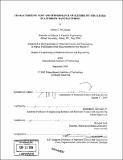Characterizing cost and performance of flexibility strategies in autobody manufacturing
Author(s)
Povelaites, Jeffrey C
DownloadFull printable version (3.770Mb)
Other Contributors
Massachusetts Institute of Technology. Dept. of Materials Science and Engineering.
Advisor
Randolph E. Kirchain, Jr.
Terms of use
Metadata
Show full item recordAbstract
Consumer demand is hard to predict in any industry, let alone the automotive industry. Vehicle manufacturers try to produce according to what their customers want, but if these wants change, the company is faced with lots of unsold cars and a huge changeover cost. In order to help fight the problems of demand variability, automotive manufacturers have begun the move towards plant flexibility. This includes designing vehicles comprised of similar subassemblies and the development of flexible tooling. The hope is that multiple vehicles can be produced on the same line so if demand starts to fluctuate, they can change the production levels of their styles with minimal lead time. There are a number of different approaches to flexible tooling. One approach using programmable robotic repositionable tools (PRRT) is particularly promising because it can handle a large number of styles and requires low style specific reinvestment costs. This thesis examines the PRRT technology as well as other forms of flexible tooling to understand the conditions under which these approaches make the most economic sense. (cont.) For this project an algorithm was developed to choose assembly tools based on subassembly characteristics, production levels, style counts, and flexibility approaches. The algorithm was connected to an already existing vehicle assembly model and two forms of economic analysis were performed. The first looked at the costs of using PRRT versus other forms of tooling for various product mixes. The second analyzed the potential cost savings when considering product changeover. The results indicated that the initial outlays for PRRTs cannot be justified even for a large number of styles unless multi-generational product changeover is also considered. However, PRRTs provide a cost effective flexible tooling option for plants producing multiple styles when considering product changeovers.
Description
Thesis (M. Eng.)--Massachusetts Institute of Technology, Dept. of Materials Science and Engineering, 2005. Includes bibliographical references (leaves 58-59).
Date issued
2005Department
Massachusetts Institute of Technology. Department of Materials Science and EngineeringPublisher
Massachusetts Institute of Technology
Keywords
Materials Science and Engineering.